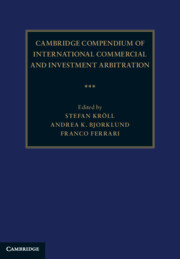Book contents
- Cambridge Compendium of International Commercial and Investment Arbitration
- Cambridge Compendium of International Commercial and Investment Arbitration
- Copyright page
- Contents
- Figures
- Tables
- Contributors
- Preface
- Part I Foundations
- Part II Public Law Questions Relating to Arbitration
- Part III Stakeholders in Arbitration
- Part IV Applicable Law
- Part V Jurisdiction of the Arbitrator
- 23 The Arbitration Agreement: Legal Nature, the Contractual and the Jurisdictional Aspect
- 24 The Various Forms of ‘Consent’ in International Arbitration
- 25 Protecting and Challenging the Arbitrator’s Jurisdiction
- 26 The Competence-Competence Principle’s Positive Effect
- 27 The Competence-Competence Principle’s Negative Effect
- 28 The ‘Separability’ of the Agreement to Arbitrate
- 29 Admissibility versus Jurisdiction
- 30 Settlement Efforts and Contract Adaptation by Arbitral Tribunals
- Part VI The Arbitral Tribunal
- Part VII Procedural Questions in Arbitration
- Part VIII Role of State Courts in Arbitration
- Part IX Awards
- Part X Post-Award Issues
- Part XI Legal Concepts
- Part XII Areas of Concern
- Part XIII Arbitration and Related Fields
- Part XIV EU Law and Arbitration
25 - Protecting and Challenging the Arbitrator’s Jurisdiction
from Part V - Jurisdiction of the Arbitrator
Published online by Cambridge University Press: 18 February 2023
- Cambridge Compendium of International Commercial and Investment Arbitration
- Cambridge Compendium of International Commercial and Investment Arbitration
- Copyright page
- Contents
- Figures
- Tables
- Contributors
- Preface
- Part I Foundations
- Part II Public Law Questions Relating to Arbitration
- Part III Stakeholders in Arbitration
- Part IV Applicable Law
- Part V Jurisdiction of the Arbitrator
- 23 The Arbitration Agreement: Legal Nature, the Contractual and the Jurisdictional Aspect
- 24 The Various Forms of ‘Consent’ in International Arbitration
- 25 Protecting and Challenging the Arbitrator’s Jurisdiction
- 26 The Competence-Competence Principle’s Positive Effect
- 27 The Competence-Competence Principle’s Negative Effect
- 28 The ‘Separability’ of the Agreement to Arbitrate
- 29 Admissibility versus Jurisdiction
- 30 Settlement Efforts and Contract Adaptation by Arbitral Tribunals
- Part VI The Arbitral Tribunal
- Part VII Procedural Questions in Arbitration
- Part VIII Role of State Courts in Arbitration
- Part IX Awards
- Part X Post-Award Issues
- Part XI Legal Concepts
- Part XII Areas of Concern
- Part XIII Arbitration and Related Fields
- Part XIV EU Law and Arbitration
Summary
Arbitrators derive their jurisdiction from the agreement of the parties. The underlying contractual basis of their jurisdiction and the supervisory powers of the courts over arbitrator’s jurisdictions raises several issues which are examined in this chapter.
The first part of the paper briefly examines the principle of competence-competence and its ramifications on various matters, such as who has, or should have, priority to rule on jurisdiction (the courts or the tribunals) and what should be the appropriate level of scrutiny by the supervising courts.
The second part examines which issues are to be regarded as ‘jurisdictional’. A broader or narrower understanding of the term will reflect on the scope of the courts’ review.
The third part examines who and when is to rule on jurisdiction and the various scenarios that can be triggered depending on how the jurisdictional review is initiated. Prior to the constitution of the tribunal the matter can only be brought before the court. Once the tribunal is constituted, the issue of jurisdiction can be brought both before the court and before the tribunal, and the court may be called upon to review tribunal’s findings. Post-award jurisdictional review can be triggered both in the set-aside and recognition proceedings. Issues of particular importance in this regard are standard of review to be used by the courts and whether the courts should be entrusted to review negative jurisdictional rulings of the tribunals.
The final part of this chapter discusses anti-suit and anti-arbitration injunctions and their perceived pros and cons, form and legal basis.
Keywords
- Type
- Chapter
- Information
- Publisher: Cambridge University PressPrint publication year: 2023

